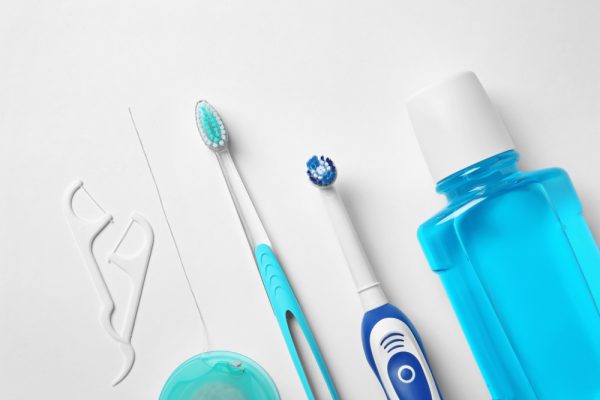How to Care for Your Dental Implants After Surgery
Proper care is essential during the postoperative period to ensure the success of your dental implant procedure. Make sure you’re following the instructions given to you by your dentist to avoid dental implant complications or infections. The following guide created by our dentists is a resource for post-op dental implant care.

Immediate Post-Op Instructions for Dental Implants
After the implant procedure, your dentist will provide specific instructions on how to practice good oral hygiene. These instructions may include:
- Avoid smoking and using straws for the first 24 to 48 hours
- Apply an ice pack to the affected area for the first 24 hours to reduce swelling
- Avoid crunchy, spicy, or hard foods for the first few days
- Take any prescribed pain medication as directed
- Use an antimicrobial mouthwash as directed
- Keep the surgical area clean by gently rinsing it with salt water
- Schedule a follow-up appointment to visit your dentist in the next few days
Bleeding
Bleeding is a common side effect of the dental implant procedure, and most patients with implants will experience minor bleeding for the first 24 hours afterward. You can manage bleeding by biting down on a gauze pad provided by your dentist for about 20 to 30 minutes. This will help form a blood clot at the implant area and stop the bleeding.
If bleeding persists or becomes heavy, contact your dentist immediately, as this could be a sign of a complication. Your dentist may recommend additional measures, such as reapplying gauze or taking medication to help stop the bleeding.
Swelling
Swelling is a common side effect of the surgery and can be managed by applying ice packs to the affected area for the first 24 hours. Avoiding hard or crunchy foods, like potato chips and hard candy, for the first few days can also help reduce swelling.
Managing Pain
Your dentist may prescribe pain medication to help manage any discomfort you experience after the procedure. Be sure to take the medication as directed and contact your dentist if your pain becomes unbearable or persistent.
Diet
Stick to a soft foods diet for the first few days following the procedure to avoid putting unnecessary pressure on the surgical site. Avoid chewing around the implant as it can cause irritation. As you heal, you can gradually return to your normal diet. Maintaining a proper diet as your dental implants are healing is essential for a successful treatment and great for your overall health.
Avoid smoking and alcohol consumption after the procedure as it can interfere with the healing period and cause complications. Also, make sure you stay hydrated with plenty of water and avoid drinking through a straw.
Oral Hygiene Care
Oral hygiene is a crucial component of post-op care for dental implants. Keep the implant site and surrounding teeth clean to prevent infection and promote healing. Immediately following the procedure, avoid brushing or flossing the implant site for the first 24 hours.
After that, you should brush your teeth, and the implant site gently. You can use a soft-bristle toothbrush and gentle circular motions to clean the implant site. Make sure you also floss daily.
Your dentist may also recommend including an antimicrobial mouthwash in your dental hygiene routine to help reduce the risk of infection and promote healing. Follow your dentist’s instructions regarding mouthwash, as overuse or misuse can be harmful to oral health.
Physical Activity
Avoid strenuous physical activity for the first few days following the procedure to allow the implant area to heal properly. Gradually return to your normal activity level as directed by your dentist. Overexertion may lead to post-op bleeding or discomfort, so do your best to take it easy for the first few days of your recovery.

Frequently Asked Questions
No, it’s not recommended to smoke after getting a dental implant. Smoking decreases the chances of implant success and increases the risk of implant failure. It can also delay healing, increase your risk of infection, and cause complications after dental implant placement such as peri-implantitis, (inflammation of the tissue surrounding the implant).
Smoking decreases the blood supply to the implant area, slowing down the healing process and making it more difficult for the implant to naturally fuse with the jawbone. Additionally, smoking can also cause a decrease in bone density, making it harder for the implant to secure in the jaw.
Several symptoms may indicate a dental implant infection. Some common signs to look out for include:
- Pain or discomfort around the implant
- Swelling or redness in the area
- Warmth or tenderness to the touch
- Dealing with drainage or pus
- A foul taste or odor coming from the implant
- A fever or feeling unwell
- Difficulty biting or chewing
- Loss of implant stability or mobility
If you experience any of these symptoms mentioned above, contact your dentist immediately. They’ll diagnose the problem and recommend an appropriate treatment. Remember to maintain good oral hygiene and follow your dentist’s instructions for dental implant post-op care to prevent infection.
Dental implants are meant to function like natural teeth, so it’s essential to take care of them in the same way. This includes brushing twice a day with a soft-bristled toothbrush and non-abrasive toothpaste, flossing daily, and using an antiseptic mouthwash to help kill bacteria.
You should also see your dentist for regular checkups and cleanings to ensure the longevity of your dental implants. Also, avoid biting hard objects and smoking as it can cause implant failure.
Exercise is generally discouraged for the first few days after the surgery as it can cause increased blood flow to the area, slowing down healing. It’s best to avoid strenuous exercise or physical exertion for at least the first week after surgery and consult with your dentist before resuming any exercise regimen.
After you receive dental implants, make sure to schedule regular checkups with your dentist to ensure the implant is properly healing. The frequency of these regular dental checkups will depend on the individual case and the type of implant procedure.
Schedule a follow-up visit with your dentist within the first week after surgery to check on the healing process. After that, your dentist will schedule additional visits based on your progress every 2 to 4 weeks for the first few months post-surgery. Once the implant treatment is complete, you’ll likely return to your regular schedule of visits every six months or as advised by your dentist.
Post-Op Care is Essential
Dental implant maintenance after your surgery is essential for achieving implant success. Our Seattle dentist will make sure you have the instructions you need to perform the best post-op implant care. For more information about dental implants at our Seattle office, contact us today.
